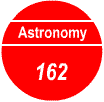|
Dr. Mark Littmann
295 Communications Building Phone: 423-974-8156 littmann@utk.edu |

|
Course: Astronomy 162
Semester: Spring, 1998 Classroom: P415 Lectures: 3:40-4:55 TR |
| Java Credit: Michael Ewert |
|
Dr. Mark Littmann
295 Communications Building Phone: 423-974-8156 littmann@utk.edu |

|
Course: Astronomy 162
Semester: Spring, 1998 Classroom: P415 Lectures: 3:40-4:55 TR |
|
|
|
|
|
|
|
| TEXTBOOK: Astronomy: Voyages through the Universe, by Andrew Fraknoi, David Morrison, and Sidney Wolff |
| Stars, Galaxies, and the Universe | ||||
|---|---|---|---|---|
| Chapter 4 | Radiation & Spectra | Chapter 15 | The Sun's Power | |
| Chapter 14 | The Sun | Chapter 20 | Birth of Stars | |
| Chapter 16 | Analyzing Starlight | Chapter 21-23 | Deaths of Stars | |
| Chapter 17 | Stars: Celestial Census | Chapter 24-25 | Galaxies | |
| Chapter 18 | Celestial Distances | Chapter 27-28 | Cosmology |
TESTS AND GRADING: The lecture portion of this course will comprise 75% of
your grade and the laboratory portion will comprise 25% of your final grade.
(Attendance at every lab is mandatory. All lab work must be completed
to avoid a grade of I or F.) In the lecture/discussion portion of the course,
there will be four written examinations - three during the term and one during
final exam period. These tests will be a mixture of fill-in, multiple choice,
matching, true/false, diagram, and essay questions. Because of class size,
makeup exams will be given only in exceptional circumstances and will be oral.
Your lowest grade in the first three exams will be dropped. The lecture
grade will thus
be the average of three tests, one of which must be the fourth test.
Tentative test schedule (subject to modification by class announcement):
 Some Web Links of Interest
Some Web Links of Interest
for Astronomy Students
If you are not familiar with the use of the World Wide Web, here is a comprehensive introduction to the use of the Web in education.
 Some Newsgroups of Interest
Some Newsgroups of Interest
for Astronomy
Students
If you are not familiar with how to use newsgroups, here is an introduction. An FAQ is a list of Frequently Asked Questions (and their answers) for a newsgroup.